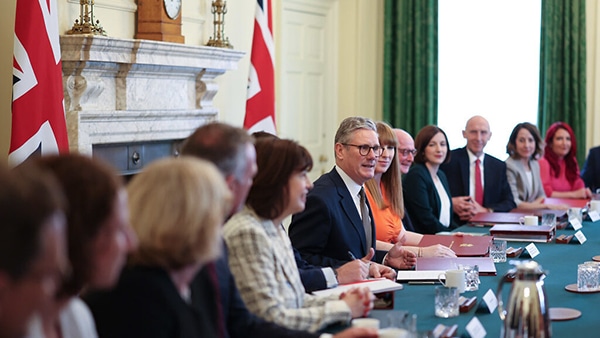Geraldine Kendall Adams, Abolition of DCMS would be a ‘step backwards’ for museums, Museums Association, 8 May 2025
Concern in sector over rumours that culture department could be broken up.

Rumours that the government is considering the abolition of the Department for Culture, Media and Sport (DCMS) have sparked concern in the culture sector.
The Sunday Times political correspondent Tim Shipman reported this week that prime minister Keir Starmer’s team “wants to abolish the Department for Culture, Media and Sport — splitting it between the business department, the education department and the Treasury — allowing them to fire Lisa Nandy, the secretary of state”.
The changes under consideration are part of a “zero-based” review being undertaken by the UK Government, which will see every budget line across all departments scrutinised from scratch ahead of the Spending Review on 11 June.
DCMS directly funds 15 national museums and galleries, along with the Historic England and the British Library, and development agencies including Arts Council England (ACE).
ACE, which is currently undergoing a review itself, administers core funds to nearly 1,000 further organisations, including more than 223 separate museum sites, via its National Portfolio.
There is a feeling in the culture sector that DCMS has been left weakened by a succession of shortlived ministerial appointments, with 13 culture secretaries serving in the role under successive governments since 2010.
However sector leaders are clear that it is vital for culture to have a representative at the highest level of government, with one museum director recently highlighting the key role played by civil servants at DCMS in securing the new £20m Museum Renewal Fund for civic museums.
“We very much hope the rumours are not true,” said Sharon Heal, director of the Museums Association. “Having a seat at the cabinet table for culture has been a positive for museums and has led to policies such as free admission for national museums and to a better understanding of the role and benefit of museums across government.
“It would be a step backwards to disperse DCMS responsibilities to other departments and could lead to reductions in budgets at a time when the sector is facing very real financial challenges.
“We need a clear strategic direction for museums in England to support them to deliver for and with their communities and this will be best achieved by a department and ministers that have a clear focus on the challenges and opportunities that our sector faces.”
Art historian and former shadow DCMS advisor Bendor Grosvenor wrote on X: “There’s lots wrong with the dept, but taking culture (the arts, heritage) out of cabinet would be a mistake.
“The arts could probably go into education. But there’ll inevitably be funding cuts. A cabinet minister is more able to lobby the Treasury for money than a junior minister in another department.”
Grosvenor called on the government to “radically reform DCMS” instead, in order to ensure the department is “more politically valuable”.
Grosvenor said the arm’s length bodies governed by DCMS had become overly bureaucratic: “[DCMS] is made helpless by being so dependent on arms length bodies. These mean the government spends money, but has little control over it.”
Nat Edwards, the director of the Royal Armouries in Leeds, said some of the debate around the future of DCMS and criticism of the department “feels like bad faith”.
“Regardless of any personal or political opinion, surely the really important debate to be had at the moment is about what public money should go to arts and culture and about what the public get back for it – in terms of real value of culture and how it makes our lives and communities better,” Edwards said in a post on LinkedIn.
“If we get drawn into some sort of bureaucratic, technical debate about into which filing cabinet we should put our accounts, there’s a real danger we lose valuable time and public attention that we could be using to talk about what makes culture worth fighting for.
“If anonymous commentators think DCMS haven’t been as effective as they could have been lobbying for culture – then maybe we cultural bodies need to up our game and give them better ammunition to use.”
The rumours about DCMS come as England’s culture sector prepares to face a new round of spending cuts over the next few years. In her recent budget statement, Rachel Reeves told all departments to prepare to slash 15% from their budgets by the end of the decade.
The government is also planning significant changes in its approach to devolution and local government, with plans to devolve more spending powers – including cultural funding – to the English regions.
The DCMS budget has already shrunk by 6% in real this year, according to the culture advocacy group Campaign for the Arts, despite an overall growth in spending across government departments. The group highlighted that the UK has one of the lowest levels of government spending on culture among European nations.
Campaign for the Arts has launched a petition calling on the government to restore funding to the DCMS budget, sustain growth in its budget over the next few years, and invest in arts and culture to “catalyse a decade of national renewal”.
“This Labour Government was elected on the promise of a decade of national renewal,” said a statement from Campaign for the Arts.
“By the end of her Spending Review on 11 June, the chancellor will have decided whether the arts are part of the picture: whether to continue to shrink arts and culture funding until 2029, or whether to turn the tide.
“The arts are not a luxury, but an essential ingredient in a healthy society. For us to thrive, the arts must too.”
